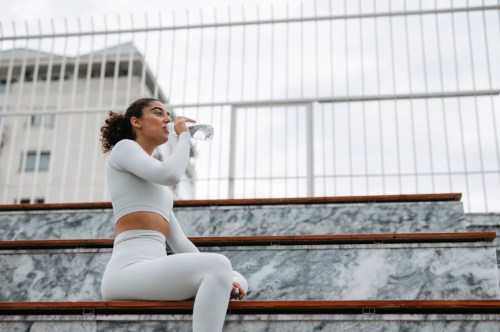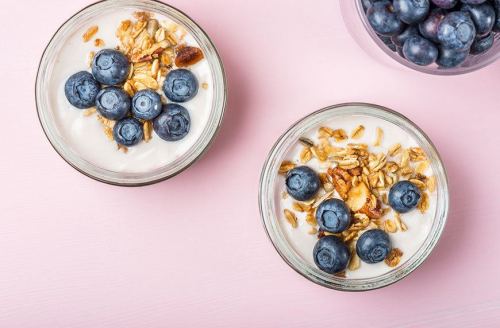Our editors independently select these products. Making a purchase through our links may earn Well+Good a commission
Realistically speaking, while water may be the primary ingredient in many of your favorite beverages, most of them are not going to be as hydrating as pure H2O. Despite your best intentions, downing three-plus lattes a day doesn’t quite cut it when it comes to keeping your body sufficiently hydrated.
Experts in This Article
For over two decades, Dr. Dana Cohen has been on the leading edge of integrative and functional medicine, guiding thousands of patients through protocols that initiate cellular repair and restore balance to the body.
Her unyielding devotion to her patients has helped countless patients on the brink of giving up hope to finally improve, recover, or completely heal from a variety of severe and chronic health issues.
While other liquids—including juice, coffee, tea, and the like—contain some of the key vitamins, minerals, and antioxidants that your body needs to function, integrative medicine physician and Quench author Dana Cohen, MD notes that these alternatives simply do not replace water in your diet. “Water is the only thing that hydrates your body,” Dr. Cohen says. “While water is the basic ingredient in all beverages, some added ingredients do more harm than good. Additives like high fructose corn syrup and other forms of added sugar, artificial colors, and other chemicals and preservatives can have detrimental effects on the body.”
What is hydration, exactly?
To take a step back, let’s take a look at what it really means to be well-hydrated. After all, if you’re consuming a beverage that is 99 percent water to begin with, could it really be the case that you’re not keeping your body functioning at its highest potential? “The definition of hydration is from a cellular standpoint,” Dr. Cohen explains. “It’s about how well your cells are holding onto the water you are consuming.” As such, the true amount of water that you need for optimal hydration varies from person to person, though Dr. Cohen points out that the best and most efficient way to hydrate is with water and electrolytes.
“Hydration is the basis of homeostasis in our bodies, which means it helps keep our bodies properly balanced,” Dr. Cohen says. “Our bodies are made up of 60 percent water, but we are constantly using this water to keep us living and moving and functioning, which means we are constantly getting dehydrated and we have to replenish the water and nutrients to become hydrated again.”
Top hydrating beverages (after water), and those that sneakily dehydrate you
1. Great for staying hydrated: Water mixed with electrolytes
While water is the best hydrating beverage, Dr. Cohen notes that there are indeed other beverages that you can turn to in order to supplement your daily intake. “For instance, an electrolyte drink made without added sugars, such as Cure, would be the first thing I’d recommend,” she says. “Cure provides your body with plant-based electrolytes including potassium and sodium via pink Himalayan salt and coconut water, so your body will actually absorb the water into your cells. It will help you hydrate effectively and quickly.”
2. Good for staying hydrated: Smoothies made with fiber-rich greens
“Green smoothies are another great beverage for hydrating because you get water from natural fruits and vegetables while also getting the nutrients and fiber to help your body absorb that water,” Dr. Cohen says. “I define smoothies as blended fruit and greens with water and then anything else you would like to add, including milk or alternative milk, ginger, nut butter, and so on.”
When it comes to juice, Dr. Cohen notes that those without added sugar can be effective. Look in particular for no sugar added juices that are paired with nutrients that can help with hydration (including potassium, sodium, and electrolytes).
Learn more about the benefits of green juice according to a dietitian in this video:
3. Okay when consumed in moderation: Coffee and tea
According to Dr. Cohen, coffee and tea should not be used as water replacements, especially because both of these beverages can act as diuretic foods, which means you’re actively expelling rather than retaining water. That said, as Dr. Cohen notes, “Anything under four cups of coffee a day is not a diuretic so it would help to contribute to hydration, but with the caveat that that may be a lot of caffeine for some people, which can be a problem for optimal functioning.”
4. Not so great for hydration: Soda
Unsurprisingly, sodas and other beverages that are high in added sugars shouldn’t be consumed in place of water as a source of hydration. “Everyone has different health and medical needs, but typically soda has a high amount of added sugar, which can be damaging to your health and dehydrating over time,” Dr. Cohen says. “I would also be mindful of your consumption of sugar substitutes like Splenda and Nutrasweet, which are found in many diet sodas. I have found so many people to have problems with these and not even know this is the cause. Often brain fog and headaches are a chief complaint, and when they dial back consumption, they resolve.”
5. Among the most dehydrating: Booze
When asked for the worst offender of all when it comes to hydration, Dr. Cohen is quick to share that alcohol fits the bill, as it is a known diuretic that dehydrates the body.
“Hydrating properly every day really is one of the most important things you can do for your health,” says Dr. Cohen. “The single most important thing you can do to treat and prevent chronic disease is to start by learning how to properly hydrate.” So whether it’s with green smoothies, electrolytes, or just a glass of regular H2O, be sure that you’re getting your body the proper amount of water to maintain its healthy functioning.
Oh hi! You look like someone who loves free workouts, discounts for cutting-edge wellness brands, and exclusive Well+Good content. Sign up for Well+, our online community of wellness insiders, and unlock your rewards instantly.
Sign Up for Our Daily Newsletter
Get all the latest in wellness, trends, food, fitness, beauty, and more delivered right to your inbox.
Got it, you've been added to our email list.











